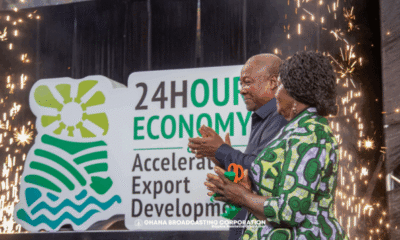Published
7 months agoon
By
Adubianews
The Chief Executive Officer of the Ghana National Chamber of Commerce and Industry (GNCCI), Mark Badu-Aboagye, has issued a stark warning: without urgent structural reforms, Ghana’s newly launched 24-hour economy could remain a mere political slogan.
Speaking on JoyNews’ PM Express on Monday, July 7, Mr. Badu-Aboagye cautioned that critical challenges like the high cost of power and credit continue to cripple the private sector, making it nearly impossible to achieve the industrial productivity the initiative aims to promote.
“Launching a 24-hour economy will not change the harsh business environment that we are facing now,” he said bluntly.
While acknowledging the recent macroeconomic gains, particularly inflation dropping to 13.7%, he argued that such indicators are only necessary conditions, not transformative ones.
“It is a good start, but it’s not enough,” he noted. “Having inflation down to 13.7% is a necessary condition, but not sufficient to change the structure of the economy.”
According to him, unless these macro improvements lead to real reductions in the cost of credit and utility bills, Ghana’s manufacturing sector cannot compete on a global scale.
“We want to see how lower inflation will reduce the cost of credit. We want to see how it will reduce the cost of utility, electricity, and water. These are key components when it comes to manufacturing.”
He pointed out that electricity tariffs for manufacturers in Ghana range between 12 to 15 cents per kilowatt-hour, among the highest globally. Meanwhile, some international competitors enjoy rates below 5 cents.
“If you really want to manufacture more, we need to bring down the cost of utility, and then that of credit,” he emphasized.
With the current policy rate at 28%, businesses are reportedly facing borrowing rates exceeding 30%, a burden Mr. Badu-Aboagye describes as stifling.
“No company would want to manufacture and export and be competitive under this condition.”
The 24-hour economy, according to the GNCCI boss, must be viewed through the lens of export competitiveness, not merely local production.
“The 24-hour economy is not only for local consumption. If it’s for local consumption, then we don’t need a 24-Hour economy because we can produce enough to feed ourselves.”
He stressed that without competitive pricing and high product quality, Ghanaian goods will struggle to survive under the African Continental Free Trade Area (AfCFTA).
“You won’t get people to buy your product just because it’s from Ghana. They will buy because it is competitive and of high quality,” he explained.
Using North African manufacturers as an example, he warned that low-cost producers within AfCFTA could easily outprice Ghanaian products if input costs remain unchecked.
In conclusion, Mr. Badu-Aboagye urged policymakers to go beyond macro figures and focus on how falling inflation and the appreciating cedi can reduce policy rates and input costs.
“Let’s look at how the improvements we are seeing now — the lower inflation and the cedi appreciation — will impact the policy rate,” he urged.
Until then, he warned, the 24-hour economy risks becoming a buzzword rather than a transformative solution for Ghana’s economic revival.


Kwaku Kwarteng Dismisses 24-Hour Economy as Empty Campaign Rhetoric


Mahama Unveils 24-Hour Economy to Position Ghana as Africa’s Investment Hub


Julius Debrah Says 24-Hour Economy Already Underway


Professor Gyasi Urges Long-Term Commitment to Ghana’s 24-Hour Economy


24-Hour Economy Lacks Real Substance – Kwadwo Poku Slams NDC’s Policy


President Mahama Confirms July 1 Launch Date for 24-Hour Economy Policy


Ekumfi MP: 24-Hour Economy Will Boost Firms Like Ekumfi Juice to Expand and Create More Jobs 

























